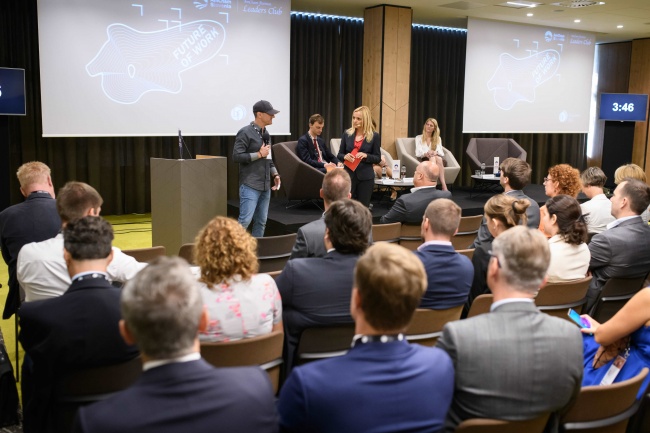AmCham Business Leaders Club Breakfast entitled "Shaping the (Digital) Future of Work: How to Bridge the Divide Between Humans and Technology" at the Bled Strategic Forum (BSF) discussed how the advancement of technology will impact future jobs, and concluded that people should not be afraid of robots but of becoming robots themselves as they forget how to connect to each other.
Alexander Plekhanov of the European Bank for Reconstruction and Development (EBRD) noted that the advancement of technology brought job polarisation all over the world. In Central and SE Europe, you have the same degree of job polarisation as in the advanced economies in the EU. "The middle skill jobs are disappearing and low skill and high skill jobs get created in the region," he added. Plekhanov also pointed out that part of the problem were demographic changes, including a longer life expectancy, as people have to work into their 70s and deal with technological change. "Age is a very important new aspect."
Tamara Pavasović Trošt of the Ljubljana Faculty of Economics said that the problem with the future of work was that a lot of research was done by companies who are only looking to increase productivity. They are looking for new skills, and want to adapt and embrace robotics, but "we also need people who will study the future of relationship between humans and technology, people from social sciences who will ask important questions." But Pavasović Trošt also admitted that the education system was actually the slowest to adapt. "They need to add more new skills, but it is still business driven," she said, adding that the aspect of humanities should not be neglected.
Tina Mendelson of Deloitte Consulting said that the future of work should be looked from the perspective of serving clients, while pointing to the important trend of convergence of technology. "When you look at the future of work, you have to look at trends, but you have to be ahead of the game," she said, noting that the things were also changing with the new talent, as millennials were coming in. "50% of our workforce are millennials – the values they brought has changed how we deal with talent and we had to fundamentally change how we operate," said Mendelson.
Patrick Cowden of the coaching company Beyond Leadership said that after working for 35 years in the IT industry, he had realised that he had lost connection with human beings and the values cherished by his ancestors. "Money is not the most important thing, but the moments of deep connections with people are," he said, adding that if people gave up human interaction, they gave everything up. "Technology has to serve us, and not vice versa."
Source: STA
You can see the video of the AmCham Business Leaders Club Breakfast HERE.
You can see the photos from the event on our Facebook page.
AmCham Business Leaders Club Breakfast was the opening event of the Business Bled Strategic Forum, whose proud partner was again AmCham Slovenia. Business Bled Strategic Forum, entitled "Future of Work" focused on the evolution of work and its impact on jobs, businesses and society at large. Besides AmCham Business Leaders Club Breakfast, other pannels included "Bridging the Divide: the Human Brain and Artificial Intelligence", "Moving from a Physical to a Digital Society" and "The Positives and the Dark Side of a Hyper-Connected World".
.png)
